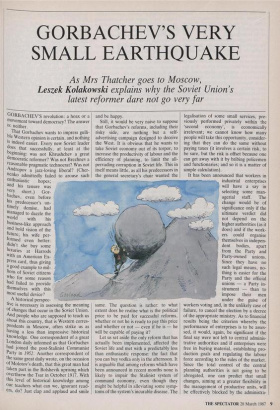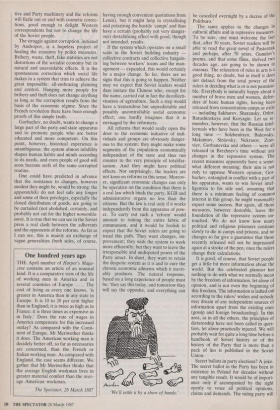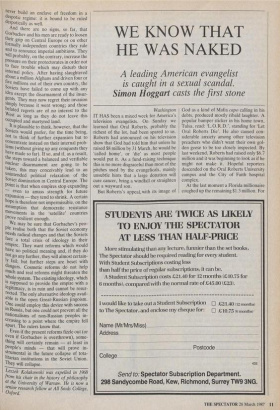GORBACHEV'S VERY SMALL EARTHQUAKE
As Mrs Thatcher goes to Moscow,
Leszek Kolakowski explains why the Soviet Union's
latest reformer dare not go very far
GORBACHEV'S revolution: a hoax or a movement toward democracy? The answer is: neither.
That Gorbachev wants to impress gulli- ble Western opinion is certain, and nothing Is indeed easier. Every new Soviet leader does that successfully, at least at the beginning: was not Khrushchev a great democratic reformer? Was not Brezhnev a reasonable pragmatic technocrat? Was not Andropov a jaz7-loving liberal? (Cher- nenko admittedly failed to arouse such enthusiastic hopes; and his tenure was Very short.) Gor- bachev, even before his predecessor's un- timely demise, had managed to dazzle the world with his business-like approach and bold vision of the future; his wife per- formed even better: didn't she buy some luxuries at Harrods With an American Ex- press card, thus giving a good example to mil- lions of Soviet citizens who for some reason had failed to provide themselves with this most useful device?
tive is necessary in assessing the meaning of changes that occur in the Soviet Union. And people who are supposed to teach us about this country, that is Western corres- pondents in Moscow, often strike us as having a less than impressive historical knowledge. One correspondent of a great London daily informed us that Gorbachev had joined the post-Stalinist Communist Party in 1952. Another correspondent of the same great daily wrote, on the occasion of Molotov's death, that this great man had taken part in the Bolshevik uprising which overthrew the Tsar in October 1917. With this level of historical knowledge among our teachers what can we, ignorant read- ers, do? Just clap and applaud and smile and be happy. Still, it would be very naive to suppose that Gorbachev's reforms, including their risky side, are nothing but a self- advertising campaign designed to deceive the West. It is obvious that he wants to take Soviet economy out of its torpor, to increase the productivity of labour and the efficiency of planning, to limit the all- pervading corruption in Soviet life. This in itself means little, as all his predecessors in the general secretary's chair wanted the same. The question is rather: to what extent does he realise what is the political price to be paid for successful reforms, whether or not he is ready to pay this price and whether or not — even if he is — he will be capable of paying it?
Let us set aside the only reform that has actually been implemented, affected the Soviet life and met with a predictably less than enthusiastic response: the fact that you can buy vodka only in the afternoon. It is arguable that among reforms which have been announced in recent months none is likely to impair the Stalinist system of command economy, even though they might be helpful in alleviating some symp- toms of the system's incurable disease. The legalisation of some small services, pre- viously performed privately within the 'second economy', is economically irrelevant; we cannot know how many people will take this opportunity, consider- ing that they can do the same without paying taxes (it involves a certain risk, to be sure, but the risk is offset because one can get away with it by bribing policemen and functionaries; and so it is a matter of simple calculation). tive and Party machinery and the reforms will fizzle out or end with cosmetic correc- tions, good enough to delight Western correspondents but not to change the life of the Soviet people.
The struggle against corruption, initiated by Andropov, is a hopeless project of healing the economy by police measures. Bribery, waste, theft, fake statistics are not distortions of the socialist economy but its natural and unavoidable effects. It is the spontaneous correction which social life makes in a system that tries to achieve the great impossible: all-embracing planning and control. Hanging more people for bribery and theft does not change anything as long as the corruption results from the basis of the economic regime. Since the French revolution there have been enough proofs of this simple truth.
Gorbachev, no doubt, wants to change a large part of the party and state apparatus and to promote people who are better educated and more competent. On this point, however, historical experience is unambiguous: the system almost infallibly shapes human habits and minds according to its needs, and even people of good will soon become serfs of the same corrupted routine.
One could have predicted in advance that the resistance to changes, however modest they might be, would be strong: the apparatchilcs do not feel safe any longer and some of their privileges, especially the closed distribution of goods, are going to be curtailed (not abolished, certainly, and probably not cut for the higher nomenkla- tura). It is true that we can see in the Soviet press a real clash between the adherents and the opponents of the reforms. As far as I can see, this is mainly an exchange of vague generalities (both sides, of course having enough convenient quotations from Lenin), but it might help in crystallising and polarising the hostile 'camps' and thus have a certain (probably not very danger- ous) destabilising effect with good, though not intended, results.
If the system which operates on a small scale in the Soviet building industry — collective contracts and collective bargain- ing between workers' teams and the man- agement — expanded, this would certainly be a major change. So far, there are no signs that this is going to happen. Neither may we expect that Soviet leaders would dare imitate the Chinese who, except for the name, carried out in fact the decollecti- visation of agriculture. Such a step would have a tremendous but unpredictable and possibly uncontrollable social economic effect; one hardly imagines that it is envisaged by the reformers.
All reforms that would really open the door to the economic initiative of indi- viduals and groups are obviously danger- ous to the system: they might make some segments of the population economically independent of the state and thus run counter to the very principle of totalifar- ianism. And they might have political effects. Not surprisingly, the leaders are not keen on reforms in this sense. Moreov- er, significant economic changes can only be operative on the condition that there is a rea1 law which binds the party, KGB and administrative organs no less than the citizens. But the law is real only if it works independently from the apparatus of pow- er. To carry out such a 'reform' would amount to ruining the entire fabric of communism, and it would be foolish to expect that the Soviet rulers are going to tread this path. They want changes, im- provement; they wish the system to work more efficiently; but they want to leave the irresponsible and undisputed power of the Party intact. In short, they want to retain the despotic system as it is and to cure the chronic economic ailments which it inevit- ably produces. The natural response, based on a long experience of people must be: 'they say this today, and tomorrow they will say the opposite, and everything can
'We'll settle it by a show of hands.'
be cancelled overnight by a decree of the! Politburo.'
The same applies to the changes in cultural affairs and in repressive measures. To be sure, one must welcome the fact that, after 30 years, Soviet readers will be able to read the great novel of Pasternak and perhaps, after 70 years, Gumilov's poems, and that some films, shelved two decades ago, are going to be shown in cinemas. The relaxation of rules in arts is a good thing, no doubt, but in itself it does not detract from the total power of the rulers in deciding what is or is not permissi- ble. Everybody is naturally happy about a number of brave men and women, defen- ders of basic human rights, having been released from concentration camps or exile — including Sakharov, Sharansky, Orlov, Ratushinskaya and Koryagin. Let us re- member, however, that the Russian intel- lectuals who have been in the West for a long time — Solzhenitsyn, BukovskY, Maksimov, Siniavsky, Nekrasov, Zino- viev, Gorbanevska and others — were all released in Brezhnev's time without any changes in the repressive system. The recent measures apparently have a some- what different meaning; their aim is not only to appease Western opinion; Gor- bachev, entangled in conflict with a part of his apparatus, wants to win Soviet intel- ligentsia to his side and, assuming that there is a minimum feeling of common interest in this group, he might reasonably expect some success. But again, all those measures, however desirable, leave the foundation of the repressive system un- touched. We do not know how many political and religious prisoners continue slowly to die in camps and prisons, and no changes so far give a guarantee that those recently released will not be imprisoned again at a stroke of the pen, once the rulers change their calculations.
It is good, of course, that Soviet people get a little bit more information about the world. But the celebrated glasnost has nothing to do with what we normally mean by the freedom of information, let alone of opinion, and is not even the beginning of this freedom. The information is ladled out according to the rulers' wishes and nobody may dream of any independent sources of information apart from the existing ones (gossip and foreign broadcasting). In this area, as in all the others, the principles of dictatorship have not been called in ques- tion, let alone practically injured. We will probably wait for quite a long time before a handbook of Soviet history or of the history of the Party that is more than a pack of lies is published in the Soviet Union.
Secret ballots in party elections? A joke. The secret ballot in the Party has been in existence in Poland for decades without any tangible result. It would be of import- ance only if accompanied by the right openly to voice all political opinions, claims and demands. The ruling party will never build an enclave of freedom in a despotic regime: it is bound to be ruled despotically as well. And there are no signs, so far, that Gorbachev and his men are ready to loosen their grip on Central Europe or on other formally independent countries they rule and to renounce imperial ambitions. They will probably, on the contrary, increase the Pressure on their protectorates in order not to face trouble which may disturb their internal policy. After having slaughtered about a million Afghans and driven four or five millions out of their own country, the S. oviets have failed to come up with any idea except the disarmament of the insur- gents. They may now regret their invasion simply because it went wrong; and those belated regrets are of no interest to the West as long as they do not leave this occupied and martyred land. It.is plausible to think, however, that the Soviets would prefer, for the time being, not to think of further expansion but to concentrate instead on their internal prob- lems (without giving up any conquests they have made so far). If so, and if, as a result, the steps toward a balanced and verifiable nuclear disarmament are going to be taken, this may conceivably lead to an unintended political relaxation of the Soviet domination in Central Europe. The Point is that when empires stop expanding ---- even to amass strength for future expansion — they tend to shrink. A certain hope is therefore not impermissible, on the assumption that democratic resistance movements in the 'satellite' countries Prove resilient enough. We may be sure that Gorbachev's peo- ple realise both that the Soviet economy needs radical changes and that the Soviets face a total crisis of ideology in their empire. They want reforms which would have no political meaning and, if they do not go any further, they will almost certain- ly fail; but further steps are beset with dangers. Cosmetic reforms do not help much and real reforms might threaten the Whole system. The existing ideology, which is supposed to provide the empire with a legitimacy, is in ruin and cannot be resur- rected. The only alternative ideology avail- able is the open Great-Russian jingoism. One could employ this device with success in Russia, but one could not prevent all the nationalisms of non-Russian peoples in- creasing to a point where the empire fell apart. The rulers know that.
Even if the present reforms fizzle out (or even if Gorbachev is overthrown), some- thing will certainly remain — at least in People's minds — that will prove in- strumental in the future collapse of tota- litarian institutions in the Soviet Union. They will collapse.
Leszek Kolakowski was expelled in 1968 from his chair in the history of philosophy at the University of Warsaw. He is now a senior research fellow at All Souls College, Oxford.




















































 Previous page
Previous page